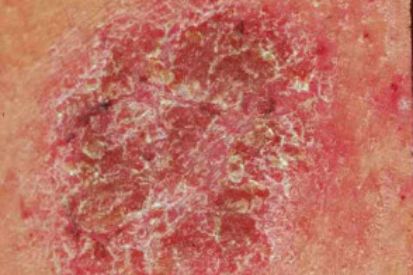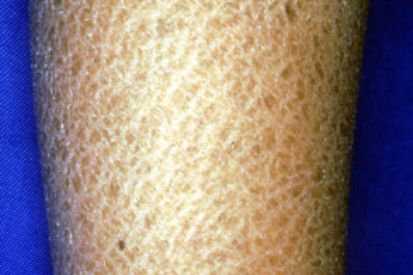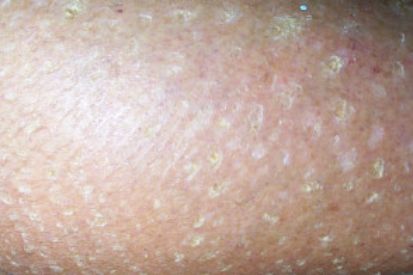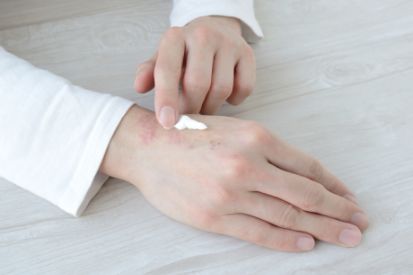Dry Skin
Our dermatologists can offer various remedies to alleviate dry skin. They may recommend using gentle cleansers and moisturizers with ingredients like hyaluronic acid or ceramides to lock in moisture. Your healthy skin is our top priority at Dermatology Affiliates. Explore more about dry skin below and schedule your skin consultation.
Examples of Dry Skin




What are the Symptoms of Dry Skin?
- Skin may appear flaky or develop small, fine scales.
- Dry skin often causes itching, which can be mild to severe.
- The affected skin may become red or irritated.
- Dry skin can make the skin feel tight and rough, especially after bathing.
- In severe cases, the skin may develop cracks or fissures.
What are the Causes of Dry Skin?
- Dry skin can result from a variety of factors, including low humidity, harsh weather, hot water, aging, certain medical conditions, and dehydration.
- Dry skin occurs when the skin lacks moisture, often exacerbated by external factors like harsh soaps and internal factors like inadequate hydration.
How to Prevent Dry Skin
Preventing dry skin involves adopting a skincare routine and lifestyle practices that promote moisture retention. Here are several key strategies:
- Moisturize: Use a suitable, fragrance-free moisturizer to keep the skin hydrated. Apply it after bathing to lock in moisture.
- Protect from harsh conditions: Wear appropriate clothing to shield the skin from harsh weather, wind, and sun exposure.
- Build a custom skincare routine: Work with your skin care expert to build a routine specific to your needs.
If your dry skin is a persistent issue, we recommend scheduling an appointment with one of our certified skin experts. Our team can help you create a personalized treatment plan to alleviate your dry skin issues. Schedule today.
FAQs for Dry Skin
Yes, your diet can significantly impact skin health. Staying well-hydrated by drinking plenty of water is crucial for maintaining skin moisture. Including foods rich in essential fatty acids, like omega-3 and omega-6, can help enhance skin hydration. Additionally, consuming a balanced diet full of vitamins and minerals, such as vitamins A, C, and E, along with zinc, supports overall skin health and can improve the appearance and texture of dry skin.
Yes, dry skin is typically more common during cold, dry seasons. Winter weather, combined with lower humidity levels, can significantly worsen skin dryness. The harsh, cold air and indoor heating systems often strip moisture from the skin, making it more prone to dryness and irritation. Taking extra care of your skin during these months can help mitigate these effects.
Yes, overusing skincare products or using harsh cleansers can exacerbate dry skin. Over-cleansing or applying too many products can strip your skin of its natural oils, leading to increased dryness and irritation. It's important to select gentle, hydrating products and moisturizers that are specifically designed for your skin type to maintain a healthy balance and prevent further dryness.
Yes, some medications can cause dry skin as a side effect. If you think your medications are impacting your skin, talk with your healthcare provider.
If dry skin continues, worsens, or is accompanied by symptoms like itching, redness, or cracking, it’s recommended to consult a dermatologist. They can identify the root cause, suggest suitable treatments, and offer tailored skincare advice.
From our QualDerm Family of Brands: Learn More About Dry Skin
How to Treat Dry Skin
Treatment plans often involve a combination of strategies tailored to individual needs, aiming to alleviate dryness and enhance the skin's natural moisture barrier. Regular follow-ups with a dermatologist assist in monitoring progress and adjusting treatments as necessary.
Featured Blogs

- Skin Care
- Cosmetic Treatments
Having eczema or sensitivities to fragrance can take most of the fun out of buying soaps, lotions and other skincare products.
Read More
- Skin Care
- Botox
- Cosmetic Treatments
Bridal prep is very extensive. There’s the dress, food, makeup, decor, guest list and of course the beauty routine for the bride. Read more to learn how we can help you get glowing skin.
Read More
- General Dermatology
- Sun Safety
- Skin Care
Earlier in May, a pilot study was published that showed high concentrations of 4 chemical sunscreens in the blood. This study was done over 7 days with 24 people using different mixtures of chemical sunscreens in spray, lotion, or cream forms.This was a small study to see if there was reason to really study absorption through the skin.
Read MoreFeatured Products
Check your local office for current stock!
Check your local office for current stock!


